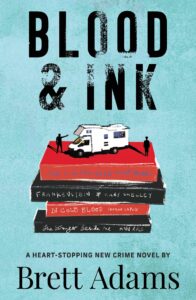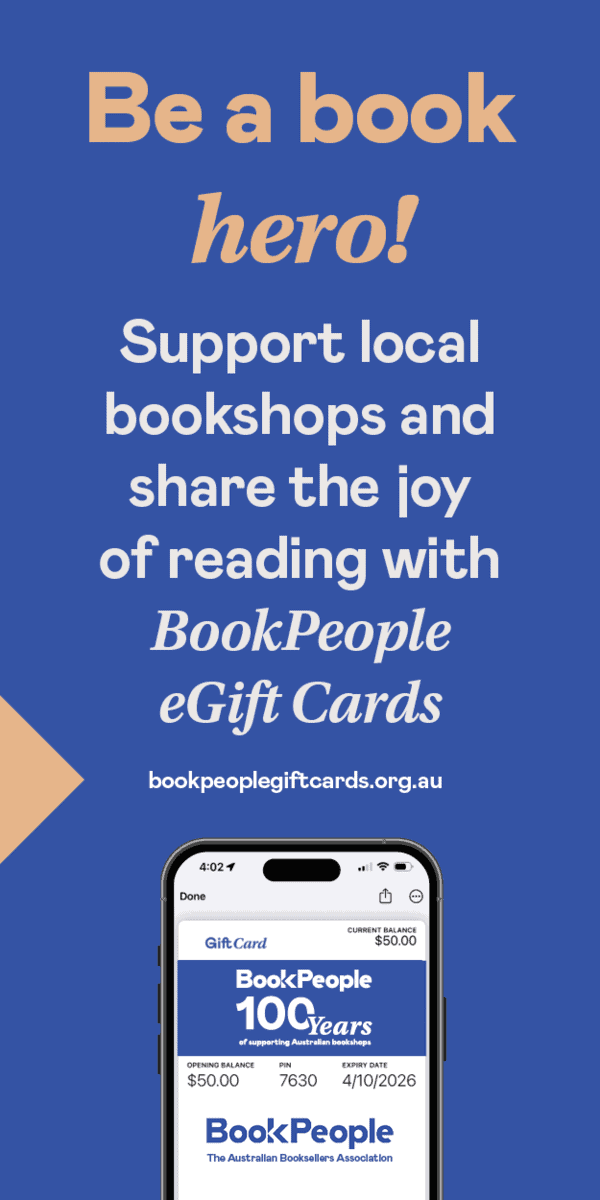BRETT ADAMS is a Perth based writer who has a PhD in Computer Science. Blood & Ink is his debut crime novel which follows a professor who is plunged into a crime writer’s fantasy and into a deadly race to protect those he loves. Read on for a Q&A with the author.
How did the idea of Blood & Ink develop, and how challenging was the experience of writing it as your first book?
The germ of Blood & Ink was both a what-if and a feel. The what-if went something like: what if you could write True Crime – not just write about True Crime but swap the medium of pen and paper for the lived experience of real people. And the feel I wanted was cinematic. Think The Fugitive, with layers. (Say it like Mike Myers.)
As for the experience of writing it, the key word was slow. It was common for a writing session to yield only a paragraph or two. Aside from being inefficient – every session began with ‘Where am I?’ – the slow pace and resulting over-familiarity of the text made it difficult to hold at arm’s length to see if it was achieving the desired effect.
Your PhD in Computer Science nurtured your love of puzzles – in what ways has this influenced your story?
Puzzles are all about seeing the connections, putting the pieces together, and enjoying that sense of ‘aha!’ that comes with completion. And if there’s a chance the reader can get there before the author, then the pay-off can be even greater. The challenge becomes making that insight possible, while avoiding both the obvious and a Deus ex Machina. The aim is one of Aristotle’s surprises that is inevitable in retrospect.
The puzzles in Blood & Ink are meant to operate at a few levels. There is the meta-play with narrative conventions and the winking at the fourth wall. The interweaving points of view are intended to be another opportunity for reader speculation. Given my background, I gravitate towards technical puzzles. The internet and smartphones are firmly embedded in our lives, but their unintended uses (and abuses) outnumber the intended, and those nooks and crannies are fertile ground for mischief.
Your novel is set in various places – from Australia, Hong Kong, England to the US – when writing do you have to think carefully about the atmosphere of places or does this come naturally to you?
I like to write what I know. If I can lean on first-hand experience of a place, I feel more confident attempting to evoke it. The details that naturally stick in my memory tend to be good candidates for visceral colour. That’s the high valence stuff, provoked by novelty or joy or shock – the micro-adaptations of life to a different clime or culture or history – and everyone’s perception is unique. As Brian Aldiss said, ‘All you have to offer [as an author] is yourself.’
Also, I don’t like to write what I know. I get bored. Which is when I hunt for any source that can help me get a feel for an unfamiliar place: Google Street View, social media, podcasts, books, well-travelled friends. Perhaps such intentional research discovers details about a place that escape the casual observer, but I live in fear of someone pointing out a glaring error.

I knew I wanted the reader to have an expectation about the road ahead, hence the five murder sheets. But I thought it would be fun to play with those expectations, which manifests as twists on expected meanings. Hiero’s game also provided a natural explanation for the slippery descriptions, because the murders had to have built-in contingency. They say writing is rewriting, and Hiero needed the opportunity to do that.
Of course, Jack had to be able to work at understanding Hiero’s plan, which brought its own set of constraints. He’s a literature professor not a detective. If he’s going to nut out a crime, he must do it with the tools to hand. The details changed as I bounced between all of these constraints and opportunities. And if a solution solved two problems at once, all the better.
How did you go about developing Hiero’s character, in particular his motivations and mental state?
Hiero was always going to be a mix of idealist and pragmatist. His desire to write ‘an immortal novel’ had to be genuine and deep, but so too did his ability to reckon with the exigencies of real life. Also, these characteristics wouldn’t be much use unless welded to a good work ethic – murder ain’t easy.
So a lot of the development was concerned with how to balance these aspects of his character. What kind of experiences and predisposition might produce that in a person? His self-sufficiency might be a response to being let down by a loved one. But that could still leave him desperately needy in other ways. And as I kept pitching these questions at the resolving plot, they bounced off with slightly different trajectories.
What makes a great crime story?
Whatever makes a great story – plus crime! When it comes to crime stories, I’m not a purist. I enjoy Raymond Chandler’s shop-worn knight sliding his way through the smoky rooms of failed gangsters and the seedy streets of world-weary hustlers, and Agatha Christie’s impeccably arranged locked-room-with-corpse. What’s common to both (besides good writing, which is a must) is a certain something that’s hard to pin down.
It’s whatever that thing is beneath a narrative’s surface of description and dialog of characters and events, that makes it cohere. Makes it organic. That breathes significance into every word. It makes the difference between loving parts of a book, and loving the book. You could call it story logic, but logic sounds so dry. This thing comprises a world of connections and values that the author will always know better than you, but perhaps only a little better.
What makes a compelling villain?
It’s a cliché by now, but the villain needs to be able to catch you unawares with their humanity. He or she has to evoke a drop of pity or at least understanding. There has to be the possibility, however slim, that they could be the hero of a different story (perhaps a very different story). Like in Seinfeld’s joke about the nature documentary – how we cheer for the lion one night, the antelope the next.
You won’t even feel the impact of a broken thing if you can’t imagine it ever having been whole. There’s no tragedy without a fall, even if the fall happened off stage.
Who are some of your favourite authors and why?
They have to write well. Usually, but not always, they convey in that first page, or paragraph even, that you’re in safe hands. You can don your slippers, settle back, and enjoy. You’ll grant that kind of author the time to prepare their fire and stoke it, knowing that when it gets roaring you’ll enjoy the warmth.
Thankfully we’re spoiled for great authors. A few that spring to mind: Tolkien for sheer imagination and humanity disguised by fantasy; Chandler for lyrical prose, hardboiled gumshoes, and reveals that creep up on you; Vernor Vinge for technical puzzles and alien perspectives; Roger Zelazny for mind-warping imagery; Jane Harper for sculpted tension and settings-become-characters. And I’m discovering new favourites all the time.
Read an Extract






